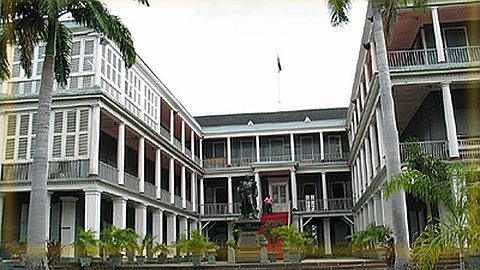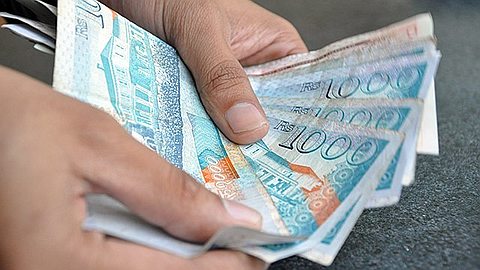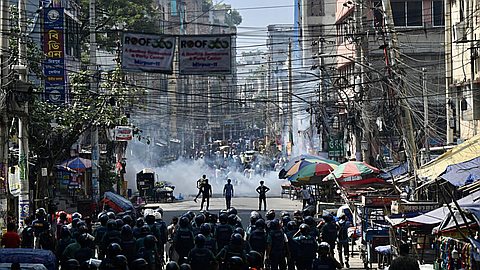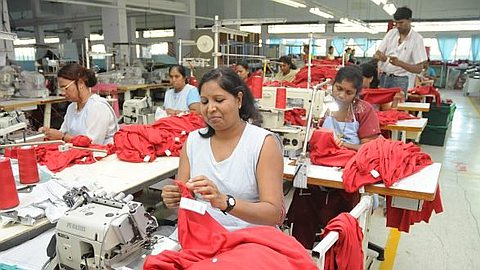42 Years for Textile: A Key Pillar
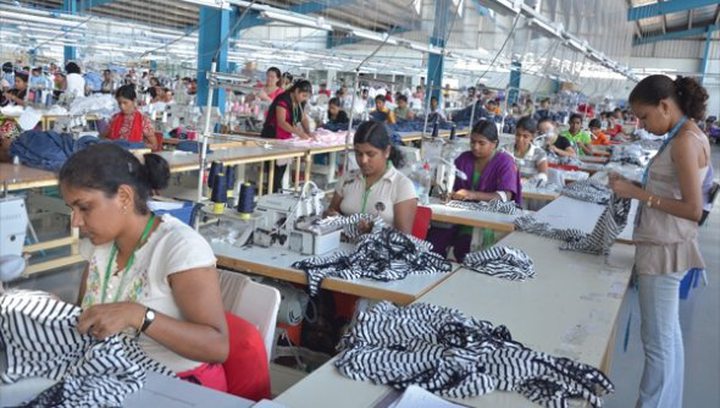
Turn to the fabric in the post-independent period has been the right decision bringing a development size. This has brought in its wake, first, diversification into a new and important pillar of the economy deuzio a step towards the emancipation of women and thirdly, on the social level, unemployment, especially urban, s' has been largely addressed providing at the same time, consolidation of the social climate.
Therefore, we can see that the scope of the textile journey goes well beyond the tens of thousands pairs of arms, primarily engaged in the manufacture of export products. Between 1970 and 1976, the textile industry has seen the establishment of 85 companies creating more than 17,000 jobs. In 1993, 550 companies settle and create 100,000 jobs in the textile sector and 80% in export. These figures show that the sector has grown some over the years.
Chandan Jankee, Economic Observer, which has also been a shift to the Development Bank, has followed this trend in a special way. And he said right away that the introduction of the zone will be many changes.
"In the 70s, after the sugar boom, Mauritius found itself in dire straits. We faced the depreciation of the rupee and significant increase in the unemployment rate. The government found itself somewhat unable to fulfill its role, especially as an employer. The introduction of the zone has caused industrial processing. Thousands of unemployed graduates have been hired. The textile industry was very profitable. The government collected the tax money was then invested in the development of the country. The money was redistributed as well, "said the Economic Observer.
From a social point of view, the textile industry has greatly improved the lives of Mauritians after Independence. Om Varma, a sociologist, says that the industry has created a sense of commitment in the population. "People at the time were willing to work hard for the country's development. Local businesses with the authorities had their eyes fixed towards one goal: the success of the country, "says the sociologist.
And to point out that this was not accomplished without difficulty. "Despite the obstacles, the country progressed economically and socially. It would be an exaggeration to say that Mauritius was isolated and depended entirely on the agricultural sector before the establishment of the textile industry. We can say that the people at the time were satisfied with very little and lived a simple life on the material plane. Lust does not exist, "he says.
Om Varma is, moreover, focus on the impact that had on the textile people's lives and their families. "Thanks to the textile industry, a lot of money is returned to the country and thousands of employees and managed to reach a steady paycheck. With more money in their pockets, the purchasing power of many people has gone through the roof, which has resulted in a significant increase in demand.
Money was used to purchase property, thereby improving the quality of life of the family. In addition, many parents were able to invest in the education of their children. In the mid 70s, there was a boom in the education sector. Current generations benefit greatly from the knowledge of these people who have had access to education thanks to the textile industry. In summary, we can say that the zone has made the necessary elements for the economic and social development of Mauritius, "said Om Varma.
Dolores Arimond "Most Loyal Employee"
Dolores Arimond has been a remarkable career in the textile industry. In fact, she took the job in May 1971 as qu'opératrice the control table at RT Knits, known at the time as "Resultant", the first factory gloves to locate in Mauritius and directed by the late Tang Hau Wing.
She climbed the ranks at RT Knits, occupying several positions during these 41 years. Currently responsible for the sampling team, she is leading a team of over 40 people.
Dolores Arimond update on his career. "At first the machines were not sophisticated. I witnessed technological developments and advances that have made this sector a global icon. I firmly believe in the future of the textile.
There is definitely a skill in Mauritius. In addition, young people interested in the fashion industry and textile. They will thus improve in areas such as the Garment Design, Graphic Design, Pattern Making, among others. The textile industry has changed a lot and became very technical, requiring real expertise. " This is what the model used recently confided to a team Challenge Media Group.
Jane Raggoo (CTSP): "We must establish a minimum wage"
The slogan: "Frans Zonn, Zonn Souffrans" has always cyclically emerged to describe some of the bad conditions in the textile and slogan will almost always emanated from trade unions and opposition.
Jane Raggoo, union representative of the Confederation of Private Sector Workers (CTSP), believes that today's value, the living conditions of workers remains grim, as if to say that this slogan is still relevant. "The textile industry is the only sector where employees work 55 hours per week, 10 hours more than other sectors. Another factor to be deplored, it is the employee's salary.
According to statistics from the Central Statistics Office (CSO), the minimum wage poverty line is Rs 6200. However, many workers zone affect only Rs 4200. These have no year-end bonus if they take their sick and their "local leaves." Women receive only Rs 500 as "maternity allowance" while employed in other sectors affect Rs 2000, "says the union.
In addition, it shows that the situation in terms of job security is uncertain. "The textile industry does not guarantee job security, because many workers are fired without justification and receive no compensation. I think it is time to review the working hours and eliminate discriminatory practices. It should also establish a minimum wage, allowing the employees of the textile industry to live decently. That Mauritius is a signatory of ILO Conventions 100 and 111 of the International Labour Office, the relevant authorities should make efforts to eliminate discriminatory practices in the field of work, "said the union representative.
Rookmala Raggoo, 56, Quatre-Bornes, "I learned a lot in 23 years"
The course is Rookmala Raggoo demonstrate that the textile industry has contributed significantly to the social development of Mauritius. It is with pride that we shared his 23 years of experience. "At the time, it was a difficult time financially. With three children in my care, I had no choice but to work in a factory in Phoenix. Despite the fact that the salary was not therefore, the atmoshere was friendly. I learned a lot and I met great friends.
During these 23 years, I also learned many crafts such as sewing and bank management data warehouse. I worked seven days and there were days when I had to work overtime until midnight. Fortunately, the driver of the company dropped us at the threshold of the door. These years of sacrifice allowed me to save for my children's education. In addition, it also allowed me to improve my personality. I have made tremendous progress and I understand many aspects of life. My life as a housewife was limited to caring for children and the home. Thanks to the textile industry, which employed many people at the time, I could be independent. Today I am a fulfilled woman and this is an inexpressible feeling, "proudly advance the fifties ..
Pawan Seewoorutun, 23, Fashion Designer: "The styling is my passion"
Young people are interested more in the textile industry. Pawan Seewooruttun, 23, was able to achieve his dream of being a stylist in a textile factory. "The styling is my passion. To be employed in the textile industry, I signed up for a Bsc Hons Textile and Fashion Design at the University of Mauritius. During my studies, I had the opportunity to learn the basics of the profession and develop basic skills.
I crafted several dresses for parades and my work has been appreciated by many people. With my license in hand, I joined a large textile companies in Mauritius in October this year. I assumed the position of Fashion Designer and I make clothes everyday such as shirts and dresses. Interact with professionals on a daily basis has allowed me to develop my creativity and build the foundation of my career, "revealed the young man.
Danielle Wong, Director of MEXA "Without textiles, Mauritius is nothing"
> What is the role of the Mauritius Export Association (MEXA) in the textile industry?
Our role is to promote the interests of companies engaged in export with textile factories. Founded in 1976, the MEXA is the only private organization in Mauritius involving exporting firms. It was named in 2007 to restructure in order to fully represent the export sector. This sector has evolved considerably over the past decade. New sectors have emerged, including production of seafood, agro-industry, jewelery and chemicals, among others. Maurice also turns to emerging markets such as Australia, Japan and African countries.
> What is, in your opinion, the contribution of the textile industry in the social development of Mauritius?
The textile industry has played an important role in the development of the country. With the introduction of the free zone in 1970, many Mauritians were out of poverty. The pay was meager but steady. The textile workers, especially women, have flourished. The textile industry has greatly contributed to the emancipation of women. Women, once dependent on their husbands, were now able to travel and learn new things.
In addition, many parents were able to finance the education of their children. The textile workers are constantly learning. Discipline and courage are among the qualities of an employee of textile. This includes the hard work is well rewarded in the end. The textile industry has allowed Mauritius to grow economically. The zone has placed Mauritius on the international market, which has forced factories engaged in export to train their employees to be workers seriously. We can say that the contribution of the textile industry in the country's social development is simply immeasurable.
> The textile industry needs new graduates. How can we attract young people into the industry evolving?
The textile industry is a resilient sector that doubles its capacity. Therefore, we do need new graduates. The textile industry provides jobs in the field of chemistry, styling and more. To attract young people into the industry in constant expansion, MEXA organizes various activities such as seminars to generate interest.
This year, we organized "Career Day" and "Open Days" in companies, to show young people all the career opportunities in the textile industry. Our goal is to demonstrate the creativity and dexterity of the textile workers. This is an industry where it grows and where it is required to do research and analysis. The role of MEXA is to establish a link between universities and enterprises in the textile industry, to encourage more young people. Many people, aged 20 to 30 years, have changed their minds on the textile industry. They were impressed by the number of innovative things we discover every day.
